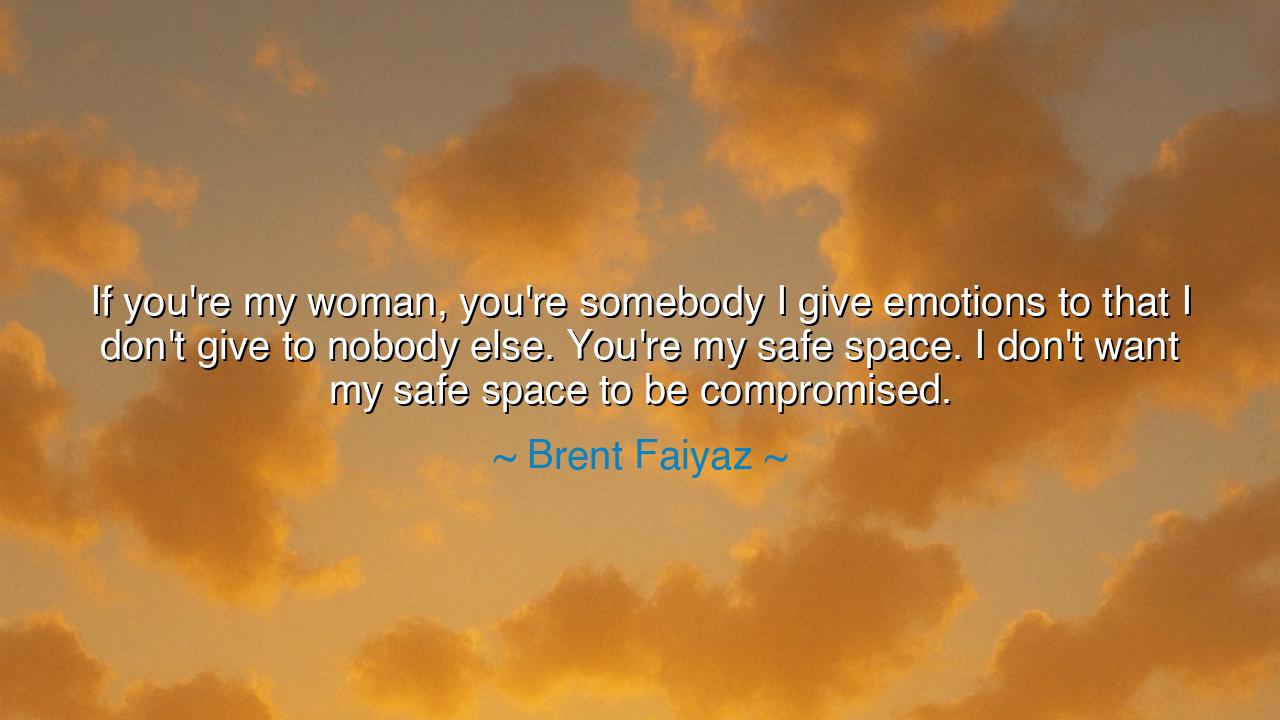
If you're my woman, you're somebody I give emotions to that I
If you're my woman, you're somebody I give emotions to that I don't give to nobody else. You're my safe space. I don't want my safe space to be compromised.






Hear the words of Brent Faiyaz, singer of truth and soul, who bares his heart with disarming honesty: “If you’re my woman, you’re somebody I give emotions to that I don’t give to nobody else. You’re my safe space. I don’t want my safe space to be compromised.” At first, these words sound like a confession of love, simple and tender. Yet within them lies an ancient wisdom: that the heart is a fortress with gates rarely opened, and when they are opened, it is not to the multitude, but to the chosen one.
For the safe space is no ordinary place. It is not a room built of stone or wood, but a sanctuary of the soul, where masks fall away and true self is revealed. Many walk through the world armored with silence, hiding their fears, their weaknesses, their deepest feelings. But to the beloved, the armor is removed. She becomes the keeper of secrets, the refuge where the weary warrior lays down his weapons. This is not a gift lightly given, for to entrust one’s emotions to another is to entrust one’s very self.
History gives us noble examples. Think of Marcus Aurelius, emperor of Rome, surrounded by intrigue, betrayal, and endless war. Yet in his writings, he spoke with tenderness of his wife, Faustina, who was his confidante and solace amid the storms of empire. The legions obeyed his commands, the Senate judged his decrees, but his safe space was not the marble halls of Rome—it was the quiet intimacy of trust with the one he loved. Even the most powerful must seek such refuge, lest the burden of life become unbearable.
Brent Faiyaz’s words also reveal a warning: “I don’t want my safe space to be compromised.” For when betrayal enters such a sanctuary, the wound cuts deeper than any blade. Trust, once broken, scars the heart and teaches it to close its gates. This is why loyalty in love is not merely a virtue, but a sacred duty. To protect the safe space of the beloved is to protect their very soul. To wound it is to strike at the core of who they are.
The meaning stretches further still. For in every human relationship, there exists the possibility of such sacred space—between friends, between family, between mentors and their disciples. The question is always the same: will we guard these spaces with care, or will we compromise them with selfishness? The strength of any bond lies not in grand gestures, but in the daily honor of another’s vulnerability.
The lesson, then, is clear: treat the safe space of love with reverence. If someone entrusts you with their unguarded heart, do not take it lightly. Protect it as you would your own life. Likewise, be mindful of where you open your own gates. Give your deepest emotions not to all, but to those who have shown themselves worthy—those who listen, who guard, who build rather than destroy. In this way, intimacy becomes not a risk, but a foundation of peace.
Therefore, O listeners, remember this teaching: to love is to become a sanctuary. Be the place where another can find rest from the world, where their emotions are safe and their soul is unburdened. And when you find such a sanctuary for yourself, cherish it, nurture it, and defend it from harm. For the true glory of love is not in passion alone, but in trust, in safety, and in the courage to be one’s unguarded self before another.






AAdministratorAdministrator
Welcome, honored guests. Please leave a comment, we will respond soon